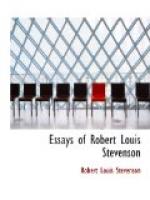first and supreme master of this manner of writing
was Montaigne, who belongs in the front rank of the
world’s greatest writers of prose. Montaigne
talks endlessly on the most trivial subjects without
ever becoming trivial. To those who really love
reading and have some sympathy with humanity, Montaigne’s
Essays are a “perpetual refuge and delight,”
and it is interesting to reflect how far in literary
fame this man, who talked about his meals, his horse,
and his cat, outshines thousands of scholarly and
talented writers, who discussed only the most serious
themes in politics and religion. The great English
prose writers in the field of the personal essay during
the seventeenth century were Sir Thomas Browne, Thomas
Fuller, and Abraham Cowley, though Walton’s
Compleat Angler is a kindred work. Browne’s
Religio Medici, and his delightful
Garden
of Cyrus, old Tom Fuller’s quaint
Good
Thoughts in Bad Times and Cowley’s charming
Essays are admirable examples of this school
of composition. Burton’s wonderful
Anatomy
of Melancholy is a colossal personal essay.
Some of the papers of Steele and Addison in the
Tatler,
Guardian, and the
Spectator are of course
notable; but it was not until the appearance of Charles
Lamb that the personal essay reached its climax in
English literature. Over the pages of the
Essays
of Elia hovers an immortal charm—the
charm of a nature inexhaustible in its humour and
kindly sympathy for humanity. Thackeray was another
great master of the literary easy-chair, and is to
some readers more attractive in this attitude than
as a novelist. In America we have had a few writers
who have reached eminence in this form, beginning with
Washington Irving, and including Donald G. Mitchell,
whose
Reveries of a Bachelor has been read
by thousands of people for over fifty years.
As a personal essayist Stevenson seems already to
belong to the first rank. He is both eclectic
and individual. He brought to his pen the reminiscences
of varied reading, and a wholly original touch of
fantasy. He was literally steeped in the gorgeous
Gothic diction of the seventeenth century, but he
realised that such a prose style as illumines the
pages of William Drummond’s Cypress Grove
and Browne’s Urn Burial was a lost art.
He attempted to imitate such writing only in his youthful
exercises, for his own genius was forced to express
itself in an original way. All of his personal
essays have that air of distinction which attracts
and holds one’s attention as powerfully in a
book as it does in social intercourse. Everything
that he has to say seems immediately worth saying,
and worth hearing, for he was one of those rare men
who had an interesting mind. There are some literary
artists who have style and nothing else, just as there
are some great singers who have nothing but a voice.
The true test of a book, like that of an individual,
is whether or not it improves upon acquaintance.
Stevenson’s essays reflect a personality that
becomes brighter as we draw nearer. This fact
makes his essays not merely entertaining reading,
but worthy of serious and prolonged study.




